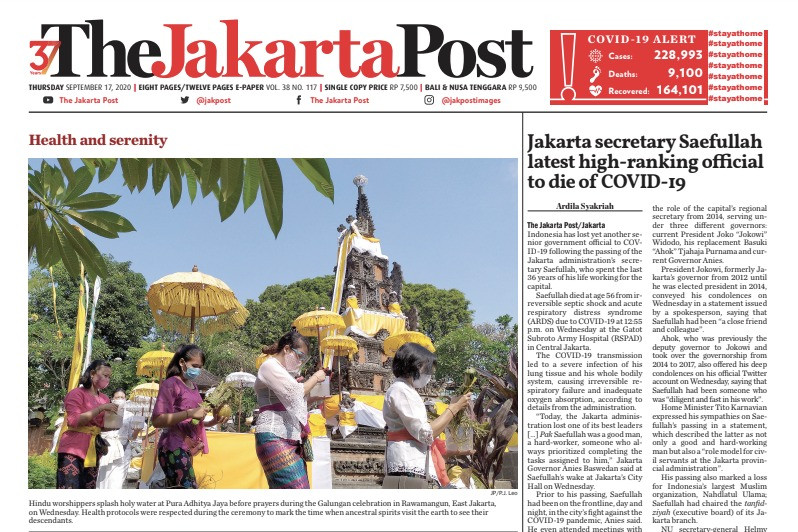Popular Reads
Top Results
Can't find what you're looking for?
View all search resultsPopular Reads
Top Results
Can't find what you're looking for?
View all search results'The Jakarta Post', 'Kompas' to participate in Google's Subscription Lab
Change text size
Gift Premium Articles
to Anyone
I
ndonesian media outlets The Jakarta Post and Kompas have been selected to participate in the first Google News Initiative Asia-Pacific (GNI APAC) Subscription Lab alongside six other media companies in the region.
Google Indonesia announced in a blog post on Thursday that the Post and Kompas would represent Indonesia in a four-month program that would seek to bolster media companies’ digital infrastructure to attract more subscriptions and reader engagement.
The six other participating media organizations are BloombergQuint and The Hindu from India, the Southeast Asia Globe from Cambodia, Business Insider Japan, Malaysiakini from Malaysia, and Commonwealth Magazine from Taiwan.
The program – developed in collaboration with FTI Consulting and the World Association of Newspapers and News Publishers (WAN-IFRA) – is set to be held in October, starting with “virtual onsite sessions” in which the selected media companies will receive a business review, a subscription diagnostic and a capability assessment.
In addition, the program will include a “publisher bootcamp”, scheduled for later this year, where the selected media companies will share their knowledge about the broader news ecosystem.
Joon-Nie Lau, the director of WAN-IFRA in the Asia-Pacific region, said the first-ever GNI APAC Subscription Lab was “timely” considering that advertising revenue had plunged by as much as 70 percent for news publishers amid record online readership.
“We hope that The Jakarta Post and the seven other selected publishers from five countries will be able to greatly benefit from this opportunity to refine and optimize their subscription plans for their readers and strengthen their business models for the sustainable, quality journalism that their readers expect from them,” Lau said in a statement.
Rohan Tiwary, head of news and entertainment partnerships at Google APAC, said he expected the program to support more media companies during their transition to a subscription-based business model.
The subscription-based model, he said, would help media organizations become more financially resilient as they weathered the decline in advertising resulting from the COVID-19 crisis.
“We believe that news publishers, both large and small, need to find ways to gain revenue from their readers for a more sustainable business,” Rohan said in a statement.
M. Taufiqurrahman, the deputy chief editor of the Post, conveyed his enthusiasm for the paper’s participation in the program, especially amid the wide-ranging impact of the COVID-19 pandemic on many industries, including the media.
“Our participation in the GNI APAC Subscription Lab will be crucial for the Post, especially in our effort to build a subscription-based media enterprise,” Taufiqurrahman said on Thursday.
He added that although COVID-19 reporting had contributed to a significant spike in the Post’s user traffic, it had failed to contribute to the company’s revenue, given that advertisers refused to buy ad space on coronavirus-related news pages.
“Many in the industry are waking up to the reality that subscription, just like in the old days of the media, is the most plausible way forward,” he said, adding that the Post was looking forward to learning from its regional peers about subscription-based models.
Since its founding in 1983, the Post has been regarded as Indonesia’s leading English-language newspaper and online media outlet. Its award-winning reportage, which rarely shies away from sensitive issues such as human rights abuses, has informed the international community about social, cultural and political developments in the country for nearly four decades.
In August, the Post won the 2020 Public Service Journalism Award from the Society of Publishers in Asia (SOPA) for the #NamaBaikKampus (#CampusReputation) collaboration.
The project, initiated in 2019 by the Post, Tirto.id, VICE Indonesia and BBC Indonesia, revealed sexual abuse allegations in higher educational institutions throughout Indonesia, based on the testimonies of 174 survivors from 79 state, private and religious universities.
The Independent Journalist Alliance (AJI) also gave the same award to the Post, Tirto and Jayapura-based publication Jubi for a joint investigation of an episode of deadly unrest in Wamena, Papua, that broke out on Sept. 23, 2019.
The Post also won bronze at the 2020 IPMA in the “Best of National Newspapers” category for its April 18, 2019, edition, in which the story "Five More Years" was featured. The story chronicled incumbent President Joko "Jokowi" Widodo’s struggle for reelection in the 2019 presidential election.
Kompas was established in 1965 by the late Jakob Oetama and Petrus Kanisius Ojong. A leading national newspaper, Kompas has since become synonymous with journalism in Indonesia.
In 2017, Kompas launched Kompas.id – the online version of the daily newspaper – paving the way for the future of subscription-based digital media in Indonesia.










